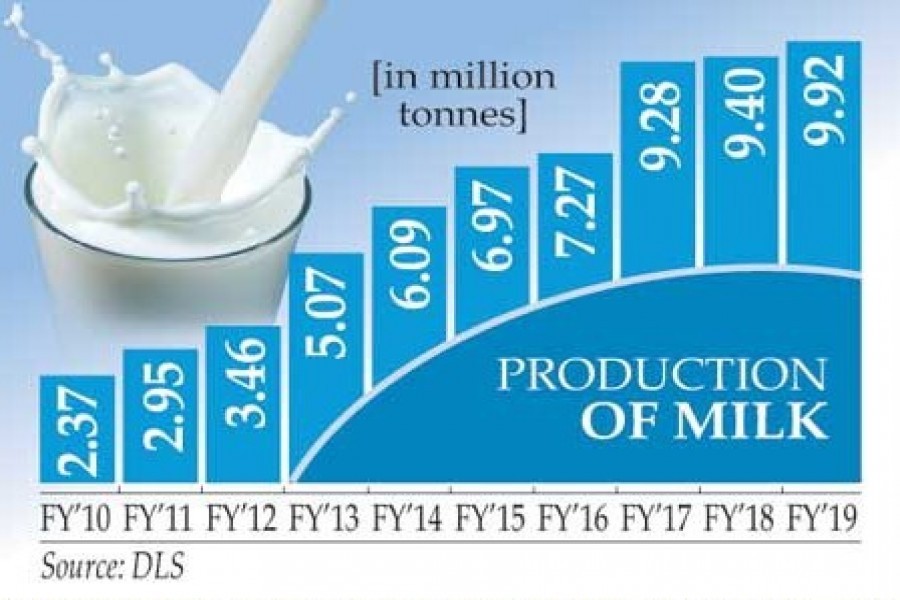In the ancient past, this region of which Bangladesh is a part, could impart knowledge about the art of livestock-raising and producing milk and its various derivatives to the rest of the world. In recent times though, it had been striving hard to meet its own demand for milk from the domestic sources. However, the picture has, of late, changed radically. The government's livestock department says the domestic production of milk in Bangladesh has registered a whopping three-fold increase in the last one decade (between FY 2008-09 and FY 2018-19) from 2.9 million MTs (metric tons) to 9.9 million MTs. Here we are talking about an industry worth Tk 90 billion comprising some 0.12 million dairy farms that employ about 9.4 million people directly or indirectly.
This is no doubt a big leap forward. Of course, the entrepreneurs who chose this agro-based sector to invest their money in do deserve the credit. But this does not detract from the farmers' contribution. The milk producers numbering millions together with the marginal farmers in addition to the small ones directly connected with dairy farms emerge as the major players working silently behind this remarkable success story. However, there is still no reason for complacency. Because, the formidable goal of meeting the nation's entire demand for milk, which stood at around 15.20 MTs in FY 2019 and is projected to increase annually remains to be fulfilled.
Therefore, the challenge before the sector is huge and in meeting it, the primary focus should be to address the woes that afflict the key players of the sector, the milk producers at the grass-roots. It has to be borne in mind that the millions of small and marginal farmers on whose hard labour the huge dairy sector thrives are in need of protection from the vagaries attributable to both humans and nature. What they need most, among other things, include the assurance of fair price for their milk, the opportunity to sell their product directly to the bulk buyers like sweetmeat-makers and dairy farms without the intervention of middlemen, access to easy and low-interest loans, assured supply of vaccines and other medicines in times of need. The imperative is to take urgent measures to provide 80 per cent vaccine coverage against the most common cattle diseases like foot and mouth disease (FMD), mastitis, goat plague, etc.
To achieve this objective, the private sector may also be allowed to import as well as manufacture vaccines and other veterinary-related medicines in sufficient quantities so that farmers are able to get those near at hand and at an affordable cost. Alongside the farmers, the dairy farm operators would also require government's help in the shape of various incentives and subsidies to produce animal fodder, grow grass, develop access to grasslands and get low-cost power and so on to run their plants.
The local dairy industry needs government's protection from an uneven completion they are exposed to from the powder milk imported from abroad. Adoption of an appropriate policy on this issue, say, a restructuring of the customs duty on this item's import would go a long way in helping the local dairy industry stand on its own feet. There is no alternative to ensuring continued wellbeing of the cattle farmers, the dairy farmers as well as good health of the farm animals, if the government wants to see an unhindered growth curve for the dairy industry.


